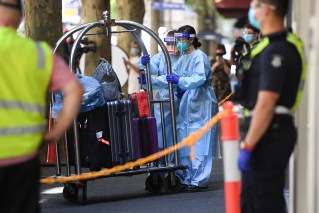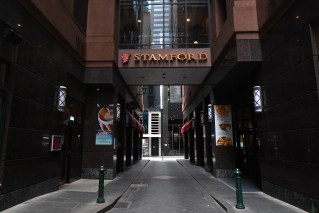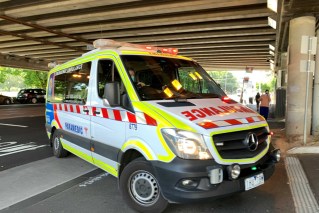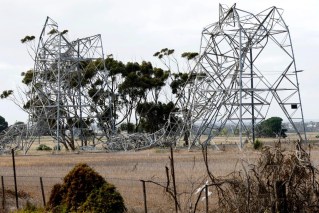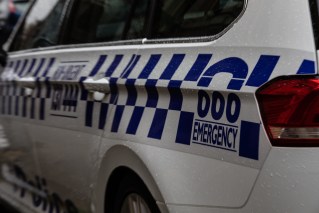Riots expose flaw in police priorities

In January, Victoria’s Chief Commissioner of Police, Graham Ashton, was slugged with a $190 fine for exceeding a freeway speed limit by a ‘shocking’ eight kilometres per hour.
That was amusing in itself, as some $800 million a year is wrung from Garden State drivers who are nailed, in the vast majority of cases, for “offences” that in any foreign jurisdiction most likely would be ignored. Who doesn’t enjoy seeing a biter bitten?
• CBD rioters will pay: Victorian Premier
• Police ‘surprised’ by city brawl
• Melbourne and Sydney erupt in violence
Why drag up Ashton’s lead-footed transgression now, as the city on the Yarra enjoys its favourite month of March when it hosts everything from a Formula One Grand Prix to the annual festival of hokey fun that Melburnians know as Moomba?
Just this: last Saturday night in Melbourne’s Federation Square there was a full-blown race riot as one street gang, the Apex boys, consisting primarily of Africans, rumbled with members of another, Islanders 23, composed for the most part of Pacific Islanders.
The Channel 9 report below conveys the havoc far better than mere words:
What made the weekend’s fist fest unusual was that the antagonists shipped their violence from the unfashionable outer-Melbourne suburb of Dandenong into the heart of the CBD, where thousands of peaceful and inoffensive folk, including many families with small children, were on hand to enjoy a Moomba fireworks display.
They were obliged to scurry for cover, some barricading themselves in restaurants, others seeking sanctuary behind the turnstiles at Flinders Street Station. The rioters owned the streets and for two hours went at it hammer and tongs.
According to reports, very few police were present to contest control of the streets with the CBD invaders. By one account, fewer than a dozen officers, hopelessly outnumbered, were on hand when the violence erupted.
Which brings us back to Commissioner Ashton’s speeding fine and the real shame of Saturday night: a simple truth, one most often ignored, is that Victoria’s citizens now fall into two distinct classes, each subject to radically different treatment by those charged with enforcing the law.

Victoria’s top cop was detected driving at 108 km/h on the Peninsula Link freeway in January. Photo: Getty
In the first category, we have families like those that assembled on Saturday for the innocent fun of skyrockets and eye-catching explosions. No doubt many in Federation Square had driven into town and, like all Victorians everywhere and every day, would have kept a wary eye on their speedometers.
Think of these people as the softest of soft targets. As they can be filmed, fined and fleeced with lucrative impugnity, so they are. Any objection to such treatment is met with lectures and publicity campaigns about the road toll, which has flat-lined over recent decades at around 300 lost lives per year.
Given the expanding population and the ever-increasing number of cars on the roads, the annual toll is probably as low as it is likely to get. So, as further significant gains must be considered unlikely, a reasonable soul might conclude the time had long since passed for authorities to turn their attention, their manpower and resources to more pressing problems. The ability of blameless citizens to watch fireworks in peace on a pleasant March evening is surely one of them.
This is where it is important to recognise citizenry’s second category. For at least a decade now, crime and violence involving ethnic gangs have been increasing in and around Dandenong, the location’s amenity considerably diminished by thuggery and brazen defiance of the law. Yet if one swallows the brochuresmanship of multiculturalism’s professional advocates, life in Dandenong and environs is a showpiece of amicable diversity.
The truth is members of local ethnic gangs – and Saturday night’s rioters – represent hard targets and it is not in the best interest of any police officer’s career to restrain or rebuke.
When brings us back to Commissioner Ashton again. When he broke the law he turned on a display of contrition and self-criticism. His mind had wandered, he confessed, but that was no excuse – and he was right about that, as tens of thousands of fellow Victorians have discovered when they appeal their speeding fines.
When a race riot erupts in the heart of a major Australian city, it is not only a Chief Commissioner’s mind that must have wandered. If the primary focus of the law and legislators has drifted so far that it is now fixed on extracting fines and revenues from motorists while kid-glove, politically correct treatment leads others to believe they can make city streets their battlegrounds, then it is self-evident that priorities and purpose have slipped a good deal further, and far more dangerously, than a top cop’s foot on the accelerator.
Roger Franklin is the editor of Quadrant Online.


